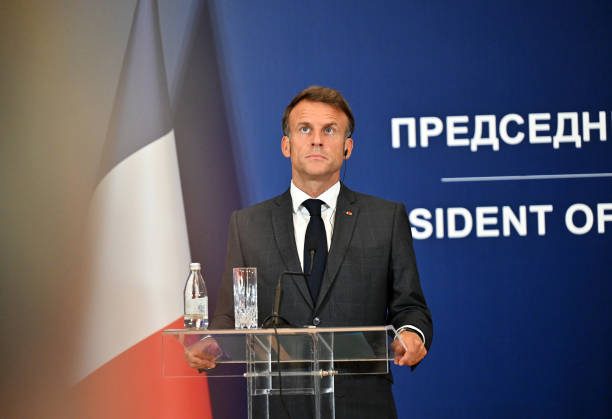The France Unbowed (LFI) party, a significant force within a broader left-wing coalition that emerged as the largest bloc in the recent July parliamentary elections, is currently mobilizing efforts to oust President Emmanuel Macron from office. This initiative follows Macron’s controversial decision to reject the coalition’s proposed candidate for prime minister, Lucie Castets.
In response to Macron’s refusal, the LFI has begun gathering signatures in support of initiating impeachment proceedings against the President. On Saturday, Mathilde Panot, the LFI’s parliamentary leader, announced the move on X (formerly Twitter).
“The draft resolution to initiate the procedure for the impeachment of the President of the Republic, in accordance with Article 68 of the Constitution, was sent today to parliamentarians for co-signatures,”
Panot stated.
For the impeachment process to move forward, the LFI, which holds 72 out of 577 seats in the National Assembly, must secure the backing of at least 10% of parliament members. Article 68 of the French Constitution provides for such a process if the President is found guilty of a breach of duty that is “manifestly incompatible with the exercise of his mandate.”
Panot further emphasized the urgency of their action, arguing that Macron’s refusal to accept the coalition’s candidate undermines democratic principles. She stated,
“Macron refuses to submit to the people’s vote, so we must dismiss him,”
adding that
“the National Assembly and Senate can and must defend democracy against the president’s authoritarian leanings.”
The LFI and its allies contend that Macron’s decision to bypass their candidate represents political maneuvering rather than a genuine effort to stabilize the government.
The broader New Popular Front (NFP) coalition, which includes the Socialists, Communists, and Greens, was formed to contest the snap parliamentary elections called by Macron earlier this year. Despite their collective victory in securing the most seats, they fell short of an outright majority, leaving Macron with the task of negotiating the formation of a new government.
Macron’s rejection of Lucie Castets, a civil servant with no formal party affiliation, as the NFP’s choice for prime minister has intensified political tensions. Macron defended his decision by arguing that such an appointment could threaten
“institutional stability.”
This has led to widespread speculation in the French media that any new prime minister could face immediate dismissal through a no-confidence vote.
Macron’s decision to call for a snap election in June followed his centrist Ensemble bloc’s disappointing performance in the European Parliament elections. During the parliamentary elections, Marine Le Pen’s right-wing National Rally (RN) initially took the lead, prompting Macron to form a last-minute “strategic voting” agreement with the NFP to prevent the RN from gaining a majority in the National Assembly.
Despite the Ensemble bloc finishing second, Macron retains the exclusive authority to appoint the prime minister, a position that is not required by law to be filled by a member of the winning party.
The RN, which finished third in the parliamentary vote, has made it clear that it will oppose any candidate put forward by the left-wing alliance. They argue that the NFP poses
“a danger to public order, civil peace, and obviously to the economic life of the country.”

















